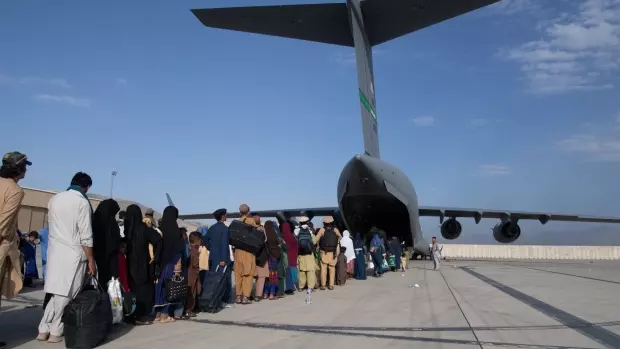Washington DC April 7 2023: The White House acknowledged that the tumultuous Afghanistan withdrawal underscored the need to better plan and more quickly implement evacuations from conflict zones in an after-action report, even as aides sought to put much of the blame on Donald Trump.
The US must “plan early and extensively for low-probability, high-risk scenarios” — and has already shifted strategies in other conflicts including Russia’s invasion of Ukraine, the White House said Thursday. As part of the review, the administration released a 12-page document and is sharing classified assessments from the Defense and State Departments with Congress.
But the document drew swift denunciation from Republicans, who said it largely amounted to an effort to shift blame. White House spokesman John Kirby said the effort was not intended as an “accountability” exercise — though the document did argue that President Joe Biden’s efforts to withdraw were hampered by Trump’s decision to draw down troop levels, release Taliban prisoners, and reduce State Department staffing.
Former President Trump, whose administration struck the deal with the Taliban for US troops to depart, responded sharply, saying his successor Joe Biden was shifting blame, as did the Republican chairman of the House Armed Services Committee. Calling the new report “a spineless piece of fiction,” Representative Mike Rogers of Alabama said it “predictably blames the Trump administration and disgracefully blames senior military advisors and the Intelligence Community for President Biden’s decisions.”
The White House account does acknowledge that Biden’s senior aides advised against speeding the 2021 withdrawal even as the Taliban made gains through the Afghan countryside. As US troops pulled out, Taliban fighters quickly overwhelmed Afghan forces and prompted a chaotic exit. A terrorist attack at the Kabul airport resulted in the deaths of 13 US troops and 170 Afghans, and some American citizens weren’t evacuated for weeks.
The administration now prioritizes more quickly initiating evacuation efforts — a strategy already seen ahead of Russia’s invasion of Ukraine, the report said.
And the White House said in the future, contingency planners need to make sure to “assess psychological factors” including local troops’ willingness to fight and “incorporate creative analytic exercises.”
“We are now deliberate and clear about the support the US government is able to provide to Americans abroad in challenging country conditions, as well as the limits of that support,” the document said.










